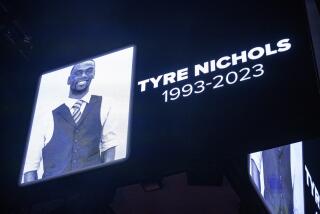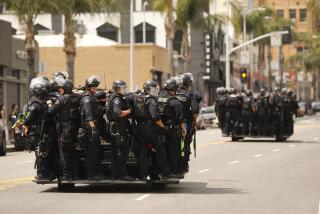Jurors Begin Deliberations in King Lawsuit : Trial: His attorney says case ‘is about race’ and compares him to figures in civil rights movement. Sides are further apart than ever on issue of monetary award.
Jurors began deliberations Wednesday in Rodney G. King’s lawsuit against the city after closing arguments in which both sides indicated they were further apart than ever on the issue of how much money King should receive from the city for his injuries.
Milton Grimes, King’s lead attorney, asked jurors to award $15 million in damages for the injuries King received in the beating that involuntarily thrust him into the national spotlight.
“Medgar Evers, Martin Luther King, Malcolm X--these people were all in the civil rights movement voluntarily,” Grimes said. “Mr. King is a symbol involuntarily, but no less a symbol.”
Deputy City Atty. Don Vincent argued that race was not a factor in the beating. He said jurors should consider only the injuries King sustained during the confrontation with police in Lake View Terrace on March 3, 1991, in determining damages.
“The city accepted responsibility for the injuries to put this case behind us,” he told the jury, asking it to award King $800,000.
The figures reflect how far apart the two camps have become now that the jury will determine how much King will receive. During settlement negotiations before the case went to trial, Grimes asked for $9.5 million and the city offered $1.25 million.
initial,3
The lawyers wrapped up their arguments in the first phase of the trial after three weeks oftestimony and 38 witnesses. After jurors determine the amount the city should pay for King’s injuries, a second phase of the trial will address individual liability of officers and other defendants.
During his summation, Grimes said King was beaten because he is black. “This case is about race,” Grimes said. “We don’t want to talk about race . . . we want to shoo it under the carpet.”
Vincent said King contributed to the confrontation with police by leading officers on a high-speed chase while he was intoxicated.
Since the incident, King has undergone medical treatments costing about $200,000 for such injuries as facial and leg fractures, Grimes said. King still suffers from flashbacks, dizziness, blurred vision and numbness in his face from multiple baton blows, his lawyer said.
“They pulverized the bones in his face,” Grimes said. King’s emotional scars are even worse, causing him to rarely venture out in public without a bodyguard and to wear a bulletproof vest.
“He has no life,” Grimes said.
In addition to the beating, King was humiliated by officers who used the racial epithet “nigger” to taunt him, his lawyer said.
Grimes said a sound expert had isolated the racial slur on a soundtrack of the beating videotape.
Vincent said he could not hear the word on the tape but he suggested that if jurors do hear it, they should consider the conditions under which it was said.
“If you make the judgment it was said, think about the emotion of those officers,” said Vincent.
But, Vincent said, “This is not a case about a word, this is not a case about racial slurs. . . . If it was said, what is a word worth?”
*
Vincent questioned whether King suffered blows to his head. He said such blows from a baton would have lacerated his skin, and there were no such lacerations.
He also brought up King’s several run-ins with the law before and after the beating, including arrests for driving under the influence of alcohol. He told the jury about a robbery conviction in 1989, a paternity suit for child support and a confrontation with police when King was accused of picking up a transvestite in Hollywood.
Vincent said that King’s injuries have largely healed and that he has been enjoying celebrity status since the beating.
Ira Salzman, who represents former Sgt. Stacey C. Koon, told jurors that Grimes’ comparisons to civil rights leaders were misplaced.
“Mr. King is a symbol of himself,” Salzman said. “It’s not black America versus the city of Los Angeles or the NAACP versus the city of Los Angeles.”
John Burris, another attorney for King, accused the city of “blaming the victim” by attempting to use King’s checkered past to show that he is not worthy of a large award.
Four officers were tried in King’s beating and acquitted of most charges in a state case, sparking three days of rioting in Los Angeles in 1992. Laurence M. Powell and Koon were later convicted of violating King’s civil rights and are serving 30-month sentences in federal prison.
More to Read
Sign up for Essential California
The most important California stories and recommendations in your inbox every morning.
You may occasionally receive promotional content from the Los Angeles Times.










